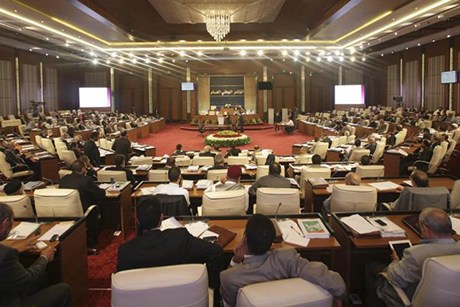By Michel Cousins and Sami Zaptia.
Prime . . .[restrict]minister-elect Mustafa Abushagur has withdrawn his cabinet list submitted to the General National Congress yesterday, Wednesday, following angry opposition to it from Congress members. They accused him of not having negotiated with them and insisted that several names were unacceptable.
At one point last night, Wednesday, as a many as 50 members walked out of Congress in protest. Most were members of Mahmoud Jibril’s National Forces Alliance (NFA) which was not included in the new cabinet. Not all of the NFA, however, walked out.
A number of those who did, as well as some independents, called for Abushagur to be sacked as the country’s next prime minister.
The cabinet list had been due to be put to the Congress today to vote on. However, according to several Congress members, Abushagur “sensing the mood of Congress”, (as one of them put it) decided to make significant changes before representing to Congress before the deadline of 7 October.
He is now due to present it on Saturday.
Discussions on the matter with him had continued until three o’clock on Thursday morning, according to a Congressman who had been at the meeting.
Congress met later in the morning to continue discussions on the crisis and whether or not they should vote on the names on the list. There was split between those who wanted to do so and those who wanted to wait for a new list.
However, proceedings were then thrown into chaos when some 200 militiamen from Zawia managed to break into the Congress hall despite the strong military presence outside. They complained that the new government did not include anyone from the town. They demanded Abushagur be sacked and that the next government include a Zawia representative.
Ironically, the incursion appears to have calmed tempers and rallied support for the prime minister-elect. “We could not have agreed to their demands,” a member of Congress told the Libya Herald. “We accept freedom of expression but not such action.” If Congress had agreed, he said, “every other town and tribe would then wanted to do the same.”
As a result Congress decided to postpone the session. During the afternoon, several Congressmen told the Libya Herald they did not know what the next step would be.
The political crisis appears to have damaged Abushagur’s credibility.
Congressmen were talking today of a shambles that had clearly demonstrated his political naivety. “We’re being led not by politicians or leaders, but by academics”, said one independent Congressmen who accused the Prime Minister-elect of negotiating only with the NFA and the Muslim Brotherhood’s Justice and Construction Party but not with the independents.
Alaeddin Mgariaf, the independent Congressmen from Benghazi, likened Abushagur and others in positions of power to “a group of people going on a picnic, not leaders”.
Another Congressman accused the Prime Minister-elect and the present Prime Minister Abdurrahim Al-Kib of being “out of touch”. They had been too long away from Libya, he said. They were “not informed” about the country. However, he vigorously denied the suggestion that Abushagur had not negotiated his list.
“He almost killed himself consulting”, he said, saying that anyone had been able to submit a name. Abushagur had taken opinions from all sections with Congress”, he insisted. Five hundred names, he said, had been submitted and assessed. But the problem was that the process had been too academic. It was “academically good” but “politically poor”.
Nonetheless, he thought that, despite being weakened, Abushagur would survive. “His chances are still alive”, he said.
[/restrict]






